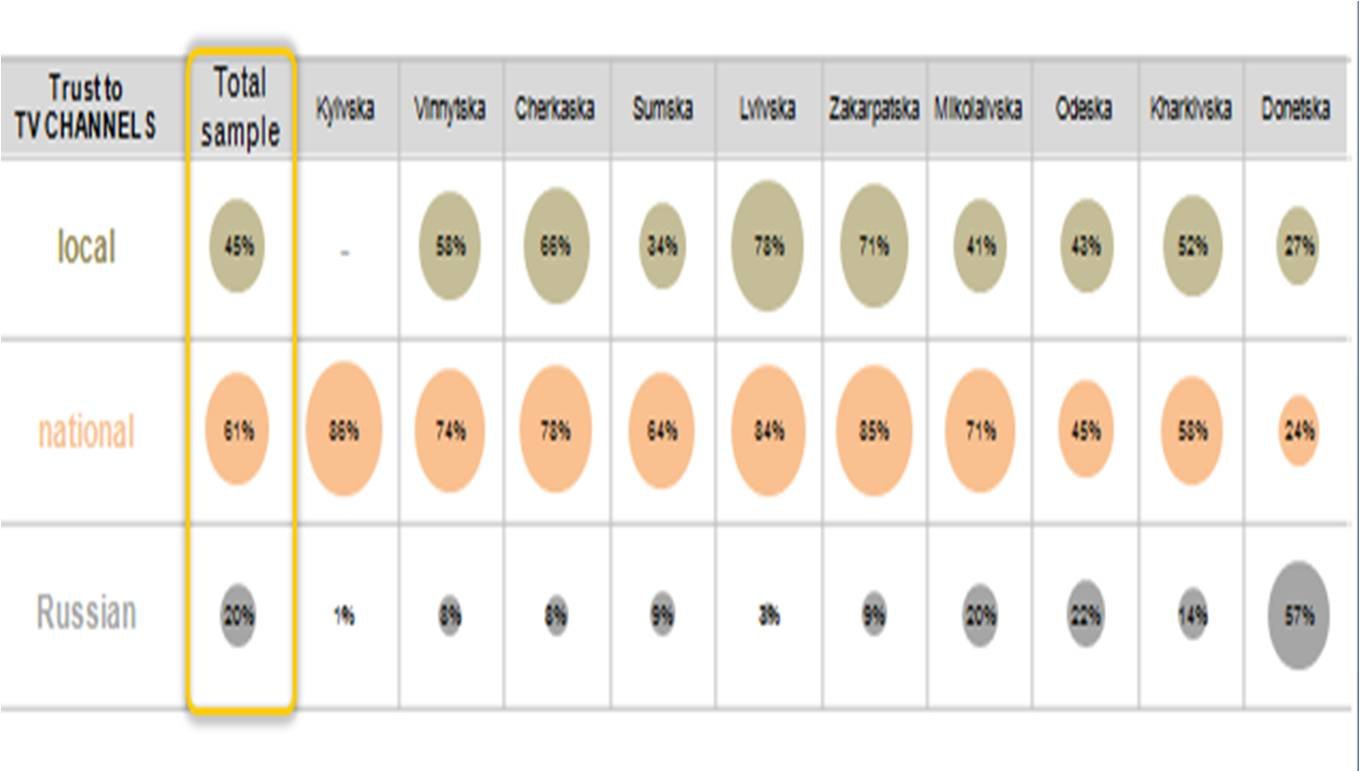Схожі новини
 Internews’ annual media consumption survey shows a dramatic drop in Ukrainians’ use of Russian media. The survey shows that Russian TV viewership shrank to 8% from 27% in 2014, and Russian internet use slid to 27% in 2015 from 44% in 2014. While lower consumption rates for Russian TV might be partially explained by the Ukrainian government’s initiative to ban transmissions of Russian TV signals within the country, internet access has not been restricted.
Internews’ annual media consumption survey shows a dramatic drop in Ukrainians’ use of Russian media. The survey shows that Russian TV viewership shrank to 8% from 27% in 2014, and Russian internet use slid to 27% in 2015 from 44% in 2014. While lower consumption rates for Russian TV might be partially explained by the Ukrainian government’s initiative to ban transmissions of Russian TV signals within the country, internet access has not been restricted.
 Internews commissioned a qualitative research on implementation of media literacy course in secondary schools of Ukraine. The study held in March-April 2015, aimed surveying teachers and students at root level to understand barriers and prospective in applying media literacy course at practice.
Internews commissioned a qualitative research on implementation of media literacy course in secondary schools of Ukraine. The study held in March-April 2015, aimed surveying teachers and students at root level to understand barriers and prospective in applying media literacy course at practice.
Conducted in cooperation with European Research Association (ERA), the research revealed that media education in secondary schools is implemented through successful combination of efforts of Academy of Ukrainian Press that trained OIPE coordinators/teachers at its schools and the Institute for Social and Political Psychology of National Academy for Pedagogical Sciences that developed the national experiment for 80 schools of 10 oblasts of Ukraine.
 Telekritia published English translation of its survey of media consumers in eastern and southern regions of Ukraine. The survey conducted by Kyiv International Institute of Sociology (KIIS) aimed analyzing an influence of Russian propaganda on eastern regions of Ukraine including occupied areas. Researchers also asked about people's perception of political situation in Ukraine. The Telekritika/KIIS survey was supported by the Department for Rights and Labour (DRL) of US Department of State through Internews Network.
Telekritia published English translation of its survey of media consumers in eastern and southern regions of Ukraine. The survey conducted by Kyiv International Institute of Sociology (KIIS) aimed analyzing an influence of Russian propaganda on eastern regions of Ukraine including occupied areas. Researchers also asked about people's perception of political situation in Ukraine. The Telekritika/KIIS survey was supported by the Department for Rights and Labour (DRL) of US Department of State through Internews Network.

Internews published needs assessment report “UNDERSTANDING INFORMATION AND COMMUNICATION NEEDS AMONG IDPs IN EASTERN UKRAINE that resulted from the 2-week trip of Internews Senior Humanitarian Advisor Jacobo Quintanilla and Internews Ukraine project manager Vitali Moroz to the East of Ukraine. From January 20-30, 2015, an Internews assessment team carried out a rapid assessment with displaced populations and host communities in eastern Ukraine to understand their information needs and access to communication channels.
 August 2014 - Internews publisized an online survey of Ukrainian journalists to study journalists’ conception of standards of journalism, interaction with media audience, journalists’ perception of condition of freedom of speech, external and internal factors, that have an influence on quality of journalists’ work and implementation of their role in society, including labor relations, level of job compensation, ethical principles of journalism, level of journalists’ professional knowledge and knowledge of media legislation concerning access to public information, defamation, handling with personal data etc.
August 2014 - Internews publisized an online survey of Ukrainian journalists to study journalists’ conception of standards of journalism, interaction with media audience, journalists’ perception of condition of freedom of speech, external and internal factors, that have an influence on quality of journalists’ work and implementation of their role in society, including labor relations, level of job compensation, ethical principles of journalism, level of journalists’ professional knowledge and knowledge of media legislation concerning access to public information, defamation, handling with personal data etc.
 MediaSapiens translated analytical overview about Russian media coverage of war conflict in Eastern Ukraine. Read about lie and falsifications in Russian news spread through TV channels and online media. Photo credit: http://www.nowtheendbegins.com
MediaSapiens translated analytical overview about Russian media coverage of war conflict in Eastern Ukraine. Read about lie and falsifications in Russian news spread through TV channels and online media. Photo credit: http://www.nowtheendbegins.com
 New research reveals that a clear majority of Ukrainians in Donetsk oblast (region) are watching both Ukrainian and Russian TV news, although trust levels of the population in Ukrainian TV is low. . Around the rest of the country, people prefer to get their news from Ukrainian TV channels. The survey in 10 regions of Ukraine was commissioned by Internews and conducted from April to June 2014 by marketing and research firm InMind for the USAID-funded Ukraine Media Project (U-Media).
New research reveals that a clear majority of Ukrainians in Donetsk oblast (region) are watching both Ukrainian and Russian TV news, although trust levels of the population in Ukrainian TV is low. . Around the rest of the country, people prefer to get their news from Ukrainian TV channels. The survey in 10 regions of Ukraine was commissioned by Internews and conducted from April to June 2014 by marketing and research firm InMind for the USAID-funded Ukraine Media Project (U-Media).
 The Internews is seeking a Content Analysis Expert /Expert Group to assist in implementation of a three-year project Strengthening Investigative Reporting in Ukraine (SIRU). The Content Analysis Expert /Expert Group will analyze the quality of investigative reports produced by Internews implementing partners and provide recommendations on quality improvement.
The Internews is seeking a Content Analysis Expert /Expert Group to assist in implementation of a three-year project Strengthening Investigative Reporting in Ukraine (SIRU). The Content Analysis Expert /Expert Group will analyze the quality of investigative reports produced by Internews implementing partners and provide recommendations on quality improvement.
- У-Медіа » English » Media Research » Internews survey reveals large majority in Donetsk still watching Ukrainian TV, but just 24% trust the veracity of the information provided
- Переглядів: 1444
- Автор: rfgtw
- Дата: 6-10-2014
Internews survey reveals large majority in Donetsk still watching Ukrainian TV, but just 24% trust the veracity of the information provided
Категорія: English » Media Research
FOR IMMEDIATE RELEASE, October 6, 2014
Internews survey reveals large majority in Donetsk still watching Ukrainian TV, but just 24% trust the veracity of the information provided
New research reveals that a clear majority of Ukrainians in Donetsk oblast (region) are watching both Ukrainian and Russian TV news, although trust levels of the population in Ukrainian TV is low. Around the rest of the country, people prefer to get their news from Ukrainian TV channels. The survey in 10 regions of Ukraine was commissioned by Internews and conducted from April to June 2014 by marketing and research firm InMind for the USAID-funded Ukraine Media Project (U-Media). Television is still the most popular source of news for 89% of people in Ukraine, and the Internet continues to beat print media and radio in terms of popularity among news consumers: 46% of those surveyed search for news on the Internet, while 29% get their news from print media, and 29% listen to news on the radio.
In an attempt to gauge the impact of the “Information War” currently being waged in the restive East, Internews asked respondents how much they consume Russian TV news. In Donetsk region, 62% of respondents said they watched Russian TV channels, and 57% trusted the Russian TV channels. Also in Donetsk, 77% of respondents said they watched Ukrainian news, but only 24% trusted what they saw on these networks. In Kharkiv and Odessa, only a minority reported watching Russian TV news, but the trust level for both Russian and Ukrainian TV news was low.
The following chart presents the degrees to which all respondents, including those who do not watch TV news, trust the accuracy of news coverage on television:

Print media continues a steep decline as a source of news for Ukrainians; 29% of respondents read papers, down 11% from the 2012 survey, while radio is holding steady. The use of the Internet, for any purpose, increased from 60 to 67% since 2012, and 62% of those who use the Internet said they read news online. The most popular information websites are the news aggregators Ukr.net (31%) and Yandex (11%), followed by the social network VKontakte at 11%. Korrespondent.net tops the list of news websites (8%), while the Hromadske.TV online service, after just seven months online, was visited by 5% of survey respondents.
InMind surveyed 3,007 citizens in 10 regions of Ukraine from April to June 2014. The sample consisted of respondents in cities with populations of 50,000 or more.
Other results:
- 32% of respondents consumed only one of the four types of media (TV, online, print, radio), while 60% consumed several types, and 6% used all four types of media.
- 66% of Ukrainians watch news on national TV every day, and 15% watch news on national TV several times a week. By comparison, only 18% watched news on Russian channels every day, while 6% of respondents watch several times a week.
- 22% of respondents check national online media every day, and another 15% do so several times per week.
- When asked about the media’s coverage of the Euromaidan protests of 2013-2014, 27% felt that national TV networks were truthful in their reporting, while 20% said national Internet news sites covered the protests truthfully. As low as those figures are, the results for local/regional TV and Internet were even lower (13% and 11% respectively) and respondents felt Russian TV and Internet provided the most inaccurate Maidan coverage ( 8% and 7%). Even in the East and South, few respondents rated Russian media coverage of the Euromaidan protests as truthful – just 24% in Donetsk and 9% in Odessa regions.
More findings are available in the English and Ukrainian survey reports on the U-Media website at http://umedia.kiev.ua/dosldzhennya. Use of the research data is permitted only with reference to the “USAID Internews U-Media project” and “InMind”.
This research is made possible by the support of the American people through the United States Agency for International Development (USAID). The research findings are the sole responsibility of Internews and InMind and do not necessarily reflect the views of USAID and the United States government.
PLEASE USE THAT LINK TO ACCESS THE FULL REPORT of U-Media Audience Survey Report 2014 in English -

